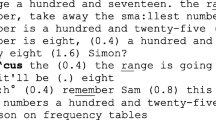Abstract
A longitudinal study is being undertaken into the question of whether or not discussion in the mathematical classroom is an aid to understanding. Preliminary analysis shows that, while the hypothesis that discussion aids understanding is very attractive, evidence to support the hypothesis has been limited. Classroom observations during the first year of the study have led to a method of classification of mathematical talk in the classroom which we expect will prove useful in investigating links between mathematical discussion and mathematical understanding.
The ability to ‘say what you mean and mean what you say’ should be one of the outcomes of good mathematics teaching .... Pupils need the explicit help, which can only be given by extended discussion, to establish these relationships (between different mathematical topics); even pupils whose mathematics attainment is high do not easily do this themselves. (Cockcroft, 1982, England)
In all other topics, we saw teachers there (Kitamaeno School in Tokyo) using peer group dialogues ... (they) justified their use of group dialogue because of their large classes (35–43) and the unusually independent spirit of many of the 600 pupils. Mathematics achievement was very high by American standards. (Easley, 1984, on a Japanese project)
We need to recognise the importance of verbalisation. Putting thoughts into words requires students to organise their thinking and to confront their incomplete understanding. Listening to others affords them the opportunities to contemplate the thinking of others and to consider the implications for their own understanding. (California State Department of Education, 1987)
This article is based on the first year of a longitudinal study intended to shed light on the question of whether or not discussion in the mathematics classroom is an aid to mathematical understanding. Before looking further at the research context in which this project is set, we wish to offer our definitions of the two notions in the title.
Similar content being viewed by others
References
Austin J. L. and A. G. Howson: 1979, ‘Language and mathematical education’,Educational Studies in Mathematics 10, 161–179.
Bell, A. W.et al.: 1986,Diagnostic Teaching — Teaching for Long Term Learning, Report of ESRC project HR8491/1, University of Nottingham.
Bell, G. H.: 1987, M. Phil thesis, University of Nottingham.
Bennett S. N.: 1978, ‘Recent research on teaching: A dream, a belief, and a model’,British Journal of Educational Psychology 48, 127–147.
Bennett, S. N.: 1985, ‘Interaction and achievement in classroom groups’, in Bennett, S. N. and Desforges, C. (eds.),Recent Advances in Classroom Research, pp. 105–119, Scottish Academic Press.
California State Department of Education: 1987,Mathematics Model Curriculum Guide. Kindergarten Through Grade Eight, Sacramento.
Cockcroft W. H.: 1982,Mathematics Counts, Report of the Committee of Inquiry into the Teaching of Mathematics in Schools, HMSO, London.
Confrey J.: 1987, ‘The constructivist’,Proceedings of PME XI, Vol.III, pp. 307–317, Montreal.
Coulthard R. M. and J. M. H. Sinclair: 1975,Towards an Analysis of Discourse, Oxford University Press, London.
Department of Education and Science: 1978,Primary Education in England — A Survey by HM Inspectors of Schools, HMSO, London.
Department of Education and Science: 1979,Aspects of Secondary Education in England — A Survey by HM Inspectors of Schools, HMSO, London.
Easley, J.: 1984, ‘A teacher educator's perspective on students' and teachers' schemes’,Conference on Thinking, Harvard Graduate School of Education, Cambridge.
Ginsburg H. P.: 1981, ‘The clinical interview in psychological research on mathematical thinking: aims, rationales, techniques’,For the Learning of Mathematics 1, 4–11.
Ginsburg H. P.: 1983,The Development of Mathematical Thinking, Academic Press, New York.
Hart K. M.: 1981,Children's Understanding of Mathematics: 11–16, John Murray, London.
Harwood D.: 1988, ‘Personal and social education through cooperative and developmental groupwork in the primary school: questions for research and development’, in Lang P. (ed.),Thinking About ... Personal and Social Education in the Primary School, Blackwell, Oxford.
Hoyles C. M.: 1985, ‘What is the point of group discussion in mathematics?’,Educational Studies in Mathematics 16, 205–214.
Kerslake D.: 1986,Fractions: Children's Strategies and Errors, NFER-Nelson, Windsor.
Pirie, S. E. B.: 1988, ‘Understanding: Instrumental, relational, intuitive, constructed, formalised ...? How can we know?’,For the Learning of Mathematics 8.
Schroeder T. L.: 1987, ‘Students' understanding of mathematics: A review and synthesis of some recent research’,Proceedings of PME XI, Vol.III, pp. 332–338, Montreal.
Schwarzenberger R. L. E.: 1984, ‘The importance of mistakes’,Mathematical Gazette 68, 159–172.
Shuard H. B.: 1984, ‘Communication in mathematics classrooms’,Oral Presentations, p. 34, ICME 5, Adelaide.
Skemp R. R.: 1976, ‘Relational and instrumental understanding’,Mathematics Teaching 77, 20–26.
Yeomans A.: 1983, ‘Collaborative groupwork in primary and secondary schools: Britain and the USA’,Durham and Newcastle Research Review, Vol. X, No. 51, pp. 99–105.
Author information
Authors and Affiliations
Rights and permissions
About this article
Cite this article
Pirie, S.E.B., Schwarzenberger, R.L.E. Mathematical discussion and mathematical understanding. Educ Stud Math 19, 459–470 (1988). https://doi.org/10.1007/BF00578694
Issue Date:
DOI: https://doi.org/10.1007/BF00578694




